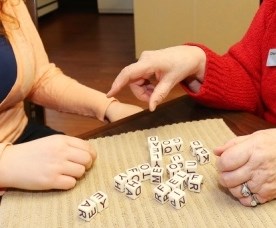A nice Christmas story was passed along by Rodger Touchie the other day.
The Victoria book publisher had just discovered there was a group of retirees, residents of seven of the larger condo projects in James Bay, who come together each Christmas to bring a bit of joy to children at the local community school and their families.
They have been doing this for 23 years. Thrifty Foods helps. So do local dentists. Every child gets a treat bag. Touchie was so impressed that he decided to donate 220 books for kids at the school.
He also spoke of an effort in which condo residents raised $40,000 for community projects and the Mustard Seed by dropping cans and bottles in refundables bins in their buildings. Older people helping kids. Pretty cool, Touchie said.
Yes, it is, but it also led to a question: Who helps the seniors?
Among all the family-friendly focus at this time of year, it’s easy to forget that not everyone has someone with whom to share the season. That’s particularly true in Victoria, given our demographics. And no, it’s not just a problem at Christmas.
B.C.’s Health Ministry highlighted the situation in a statement on Monday. “Social isolation is on the rise in Canada,” it said. Six years ago, 56 per cent of Canadians saw friends at least a few times a week. By 2017, that figure had fallen to 44 per cent.
“Statistics also show that Canadians saw family less frequently, with 26 per cent seeing family a few times a week in 2017, compared to 38 per cent in 2003,” the statement said. “The harmful effects of social isolation and loneliness have been compared to smoking and obesity.”
The ministry urged people to connect with isolated seniors in their communities. As an example of someone who does so, it used Victoria’s Maria van Sloun, who volunteers with the James Bay Community Project, which gets provincial government funding for programs for low-income seniors who live on their own. “Seniors are so appreciative that someone comes to visit them once a week,” van Sloun was quoted as saying. “I do believe when people live alone, it’s easier to get lonely and depressed. I’ve seen big changes when I start coming to take them out, and then suddenly, they start to seek out more opportunities to branch out.”
Reached at home Monday, van Sloun said she gets a lot out of volunteering, too. “I love seniors. I grew up in a multi-generational household in Germany on a farm.”
Her old job with Island Health took her into nursing homes frequently. When she retired a couple of years ago, volunteering at the James Bay Community Project was a natural fit.
She pitches in in a number of ways. There’s a program where, once a week, a group of older people comes in for a light lunch (“I stir the soup so it doesn’t burn,” she says), companionship and maybe some music or a guest speaker afterward.
Van Sloun also volunteers to drive seniors to their appointments. (“I have a Smart car. So far nobody has complained about it.”) One of those she drives is a woman who goes to Mount St. Mary’s Hospital for her weekly bath, as she can no longer bathe safely alone at home.
Van Sloun also spends an hour or two a week with each of three seniors, just to give them someone to hang out with. “I might take them out for a milkshake,” she says. One woman likes to go to the Imax, or maybe for a walk, followed by a coffee.
Not everyone needs to make van Sloun’s kind of commitment. The ministry published a list of simple ways in which anyone can help:
• Call a senior in your life.
• Have your children video chat or call older relatives and family friends.
• Offer to run an errand with a senior, to get them out and about
• Take them out for a treat.
• Bring your kids and pets to care homes that welcome them.
• Offer a ride to their next appointment.
• Offer to fix or manage something they have trouble with.
This is a good time to address isolation, van Sloun says. “Around Christmas, they really feel it.”
She plays down her altruism: “I’m also selfish. I think: ‘If I’m doing this now, maybe someone will do this for me when I get there.’ ”



